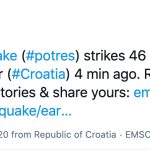The 29 December earthquake claimed seven lives and caused extensive property damage in Glina, Petrinja, Sisak and surrounding communities.
About 400 people left homeless have been placed in collective accommodation in the army barracks in Petrinja and the Topusko spa, and about 114 have so far been accommodated in houses and apartments made available by the State Office for Reconstruction. Five hundred mobile homes have been set up, while the exact number of those provided through private donations is not known, Milošević said in response to an appeal by Dragana Jeckov of the Independent Democratic Serb Party (SDSS) to speed up the accommodation and reconstruction processes.
Milošević said that over 300 structural engineers were at the scene working round the clock, that the Red Cross had distributed 467 tonnes of food and over 240,000 hot meals, and that the post-earthquake reconstruction bill was in parliament 20 days after the disaster.
“Tomorrow we will discuss amendments to the Reconstruction Act. We are ready to help the residents of Sisak as much as we can, we don’t want them to feel discriminated against,” Prime Minister Andrej Plenković said after Social Democrat Peđa Grbin asked whether the government decision to fully finance the reconstruction of the affected areas would also apply to Sisak.
“The earthquake has devastated Sisak to such an extent that the development criterion does not apply,” the prime minister said, recalling that Sisak-Moslavina County was an assisted area, while Sisak proper was not, given its development index.
Grbin noted that the prime minister had not specified whether earthquake victims in Zagreb, who are currently living in housing containers, would have their utility bills covered by the government in the same way earthquake victims in Sisak-Moslavina County would.
Speaking of vaccination against COVID-19, Plenković said that any surplus doses would be donated to “our friendly countries”, to which Marija Selak Raspudić of the Bridge party quipped: “It would be more useful for you to have a plan rather than think about surpluses that you would donate.”











